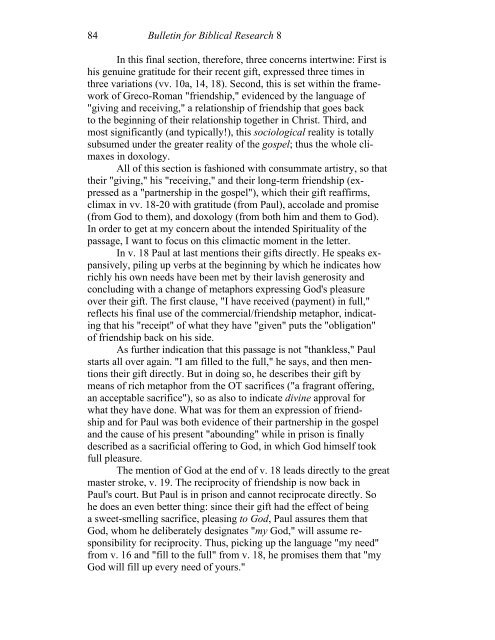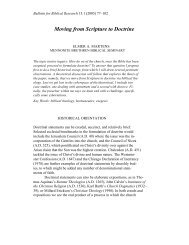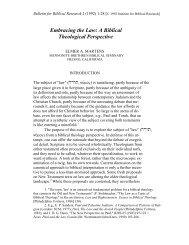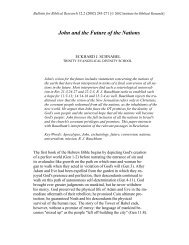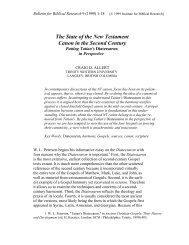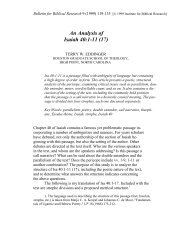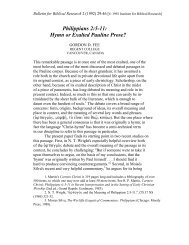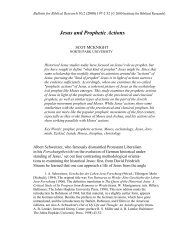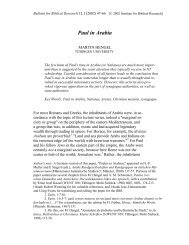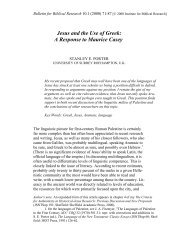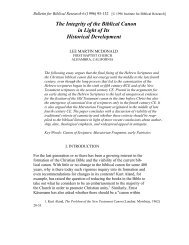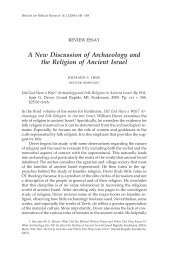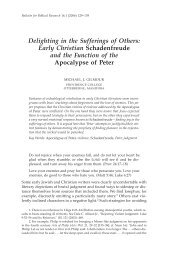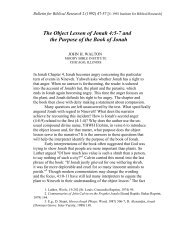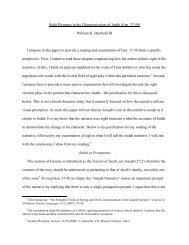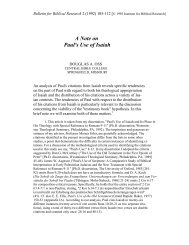Reflections on Exegesis and Spirituality in Philippians 4:10-20
Reflections on Exegesis and Spirituality in Philippians 4:10-20
Reflections on Exegesis and Spirituality in Philippians 4:10-20
Create successful ePaper yourself
Turn your PDF publications into a flip-book with our unique Google optimized e-Paper software.
84 Bullet<strong>in</strong> for Biblical Research 8<br />
In this f<strong>in</strong>al secti<strong>on</strong>, therefore, three c<strong>on</strong>cerns <strong>in</strong>tertw<strong>in</strong>e: First is<br />
his genu<strong>in</strong>e gratitude for their recent gift, expressed three times <strong>in</strong><br />
three variati<strong>on</strong>s (vv. <strong>10</strong>a, 14, 18). Sec<strong>on</strong>d, this is set with<strong>in</strong> the framework<br />
of Greco-Roman "friendship," evidenced by the language of<br />
"giv<strong>in</strong>g <strong>and</strong> receiv<strong>in</strong>g," a relati<strong>on</strong>ship of friendship that goes back<br />
to the beg<strong>in</strong>n<strong>in</strong>g of their relati<strong>on</strong>ship together <strong>in</strong> Christ. Third, <strong>and</strong><br />
most significantly (<strong>and</strong> typically!), this sociological reality is totally<br />
subsumed under the greater reality of the gospel; thus the whole climaxes<br />
<strong>in</strong> doxology.<br />
All of this secti<strong>on</strong> is fashi<strong>on</strong>ed with c<strong>on</strong>summate artistry, so that<br />
their "giv<strong>in</strong>g," his "receiv<strong>in</strong>g," <strong>and</strong> their l<strong>on</strong>g-term friendship (expressed<br />
as a "partnership <strong>in</strong> the gospel"), which their gift reaffirms,<br />
climax <strong>in</strong> vv. 18-<strong>20</strong> with gratitude (from Paul), accolade <strong>and</strong> promise<br />
(from God to them), <strong>and</strong> doxology (from both him <strong>and</strong> them to God).<br />
In order to get at my c<strong>on</strong>cern about the <strong>in</strong>tended <strong>Spirituality</strong> of the<br />
passage, I want to focus <strong>on</strong> this climactic moment <strong>in</strong> the letter.<br />
In v. 18 Paul at last menti<strong>on</strong>s their gifts directly. He speaks expansively,<br />
pil<strong>in</strong>g up verbs at the beg<strong>in</strong>n<strong>in</strong>g by which he <strong>in</strong>dicates how<br />
richly his own needs have been met by their lavish generosity <strong>and</strong><br />
c<strong>on</strong>clud<strong>in</strong>g with a change of metaphors express<strong>in</strong>g God's pleasure<br />
over their gift. The first clause, "I have received (payment) <strong>in</strong> full,"<br />
reflects his f<strong>in</strong>al use of the commercial/friendship metaphor, <strong>in</strong>dicat<strong>in</strong>g<br />
that his "receipt" of what they have "given" puts the "obligati<strong>on</strong>"<br />
of friendship back <strong>on</strong> his side.<br />
As further <strong>in</strong>dicati<strong>on</strong> that this passage is not "thankless," Paul<br />
starts all over aga<strong>in</strong>. "I am filled to the full," he says, <strong>and</strong> then menti<strong>on</strong>s<br />
their gift directly. But <strong>in</strong> do<strong>in</strong>g so, he describes their gift by<br />
means of rich metaphor from the OT sacrifices ("a fragrant offer<strong>in</strong>g,<br />
an acceptable sacrifice"), so as also to <strong>in</strong>dicate div<strong>in</strong>e approval for<br />
what they have d<strong>on</strong>e. What was for them an expressi<strong>on</strong> of friendship<br />
<strong>and</strong> for Paul was both evidence of their partnership <strong>in</strong> the gospel<br />
<strong>and</strong> the cause of his present "abound<strong>in</strong>g" while <strong>in</strong> pris<strong>on</strong> is f<strong>in</strong>ally<br />
described as a sacrificial offer<strong>in</strong>g to God, <strong>in</strong> which God himself took<br />
full pleasure.<br />
The menti<strong>on</strong> of God at the end of v. 18 leads directly to the great<br />
master stroke, v. 19. The reciprocity of friendship is now back <strong>in</strong><br />
Paul's court. But Paul is <strong>in</strong> pris<strong>on</strong> <strong>and</strong> cannot reciprocate directly. So<br />
he does an even better th<strong>in</strong>g: s<strong>in</strong>ce their gift had the effect of be<strong>in</strong>g<br />
a sweet-smell<strong>in</strong>g sacrifice, pleas<strong>in</strong>g to God, Paul assures them that<br />
God, whom he deliberately designates "my God," will assume resp<strong>on</strong>sibility<br />
for reciprocity. Thus, pick<strong>in</strong>g up the language "my need"<br />
from v. 16 <strong>and</strong> "fill to the full" from v. 18, he promises them that "my<br />
God will fill up every need of yours."


